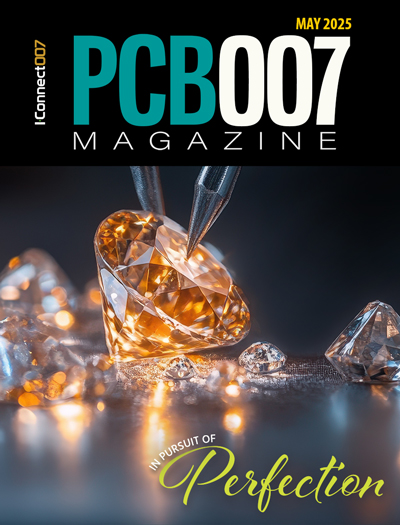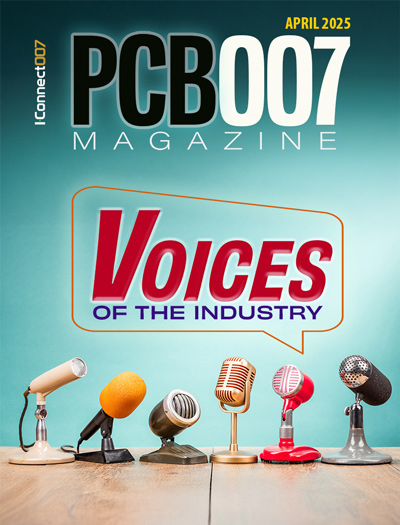-

- News
- Books
Featured Books
- pcb007 Magazine
Latest Issues
Current Issue
The Hole Truth: Via Integrity in an HDI World
From the drilled hole to registration across multiple sequential lamination cycles, to the quality of your copper plating, via reliability in an HDI world is becoming an ever-greater challenge. This month we look at “The Hole Truth,” from creating the “perfect” via to how you can assure via quality and reliability, the first time, every time.

In Pursuit of Perfection: Defect Reduction
For bare PCB board fabrication, defect reduction is a critical aspect of a company's bottom line profitability. In this issue, we examine how imaging, etching, and plating processes can provide information and insight into reducing defects and increasing yields.

Voices of the Industry
We take the pulse of the PCB industry by sharing insights from leading fabricators and suppliers in this month's issue. We've gathered their thoughts on the new U.S. administration, spending, the war in Ukraine, and their most pressing needs. It’s an eye-opening and enlightening look behind the curtain.
- Articles
- Columns
Search Console
- Links
- Media kit
||| MENU - pcb007 Magazine
Catching up with David Gerber
January 26, 2016 | Dan BeaulieuEstimated reading time: 15 minutes
Today, much of apparel manufacture has departed, partly because sewing was labor-intensive and textile manufacture was often done abroad. But my dad’s impact was to delay the departure for a generation or more, and this is significant. As textile production returns to America, and machines become more adept at sewing, industry economics will increasingly favor re-shoring.
Beaulieu: You have written about the camaraderie among the workers at the Gerber companies. There seemed to be a spirit of optimistic innovation a sense that these guys could do anything they set their minds to. I love that. I think we need more of that today, don’t you David?
Gerber: Yes, indeed. But it starts with leadership. It requires management that allows experimentation, focuses on long-term growth, invests in R&D even during recessionary times, leads by example, and is committed to the company and its employees. It also requires leading the folks on Wall Street, more than just trying to appeal to them. This fosters confidence among innovators within the organization, people who are motivated by the prospect of changing the world more than by EBITDA. To an extent, this has been lost in established companies in America, along with a more general loss of faith that technology can deliver progress and improve lives.
Beaulieu: One of the things that really struck me was your father’s attitude—that if you invent things that help mankind, the money will come. The company’s mission was mostly based on doing good things rather than making money. What do you think drove him to think that way?
Gerber: My dad started his company when he invented a device for performing engineering computations from his pajama elastic. He packed the product into his car and drove around the country for months at a time during the 1950s, visiting military and industrial customers. He sold what he had, but also learned about his customers’ processes and problems. He would then invent solutions while driving or sitting in his motel room. This remained the core of his business model: Find manufacturing problems, even ones that customers haven’t noticed; solve them with invention; and make a business out of that. He once told my sister that he started his company so he could invent. He believed that, if you do what you love, you’ll do it well and success will follow.
Beaulieu: Let’s talk about you for a minute. What is your background and what do you do when you are not writing this book?
Gerber: I grew up in West Hartford, Connecticut and earned degrees in liberal arts, engineering, and law. For a number of years, I worked for Gerber Scientific. Over the course of that time, my responsibilities were in legal, technical, and business areas. I engaged in representing the company in patent matters, conceiving products, and developing business opportunities. While writing The Inventor’s Dilemma, I was a fellow at Yale’s School of Management. My wife and I have a young son, who is at the center of our lives now.
Beaulieu: How did you go about doing the research for this book?
Gerber: My father’s life story included the Holocaust, immigrant, and industrial experiences, and spanned dozens of industries, so I employed different research strategies. But I had unparalleled access to many sources of information. One was oral history. I spoke with family, family friends, journalists, colleagues, customers, and people who had been his competitors. I cited over 150 discussions in my source notes. I had my father’s papers and 350 cubic feet of company historical materials, which I have since donated to the Smithsonian. I drew from my own experiences as a son and as an employee at Gerber Scientific. I tapped many other sources as well, of course.
Beaulieu: How did you write it? Did you complete the research first and then the writing, or did you research as you went?
Gerber: Initially, I interviewed my father, my grandmother, and others, and preserved this information. During the course of writing, I often switched between research and writing when I found the existing data pointed the story in an unexpected direction. You have to follow the data.
Beaulieu: How long did it actually take you to write the book?
Gerber: That’s hard to answer, because I worked on and off over so many years and moved between the research and writing modes. I also made changes years after submitting a comprehensive manuscript. I never tallied this up, but offhand I would say definitely more than five years. It was a serious effort.
Beaulieu: What has been the reaction from your family and friends and people who knew your father?
Gerber: Very supportive. I heard an interesting comment from a person who came to the company as a senior manager. He said he wished that he’d read the book before he came, because it explained the company culture in a way that he never understood. The company had a special culture. I think much of the difficulty that the company faced after my dad died can be attributed to the fact that this was not well understood by people from the outside.
Beaulieu: David, thanks so much for spending this time with me today. Can I impose upon you a bit more to ask you to tell us one final Joseph Gerber story that you are especially fond of?
Gerber: My dad was once negotiating a deal with officials in Romania. For tactical reasons, the Romanians delayed up until the minute he had to leave to catch his plane. After he packed up and left the meeting room, they called him back and agreed to his terms. A minister instructed his driver to rush my dad to the airport. On the way, the driver, eyeing a calculator that my dad was using, hinted that his daughter was interested in science and would love such a device. My dad promised him the calculator if my dad made the flight. When they arrived at the airport, his plane was on the tarmac, engines whirring. At my dad’s prompting the driver drove the limousine—with ministry flags waving—onto the tarmac and let my dad out. My dad left the calculator in the limousine, walked in the front of the plane, and dropped his luggage by his feet. The stairs came back out, the airline let my dad onto the plane, and he made his connecting flight. That was my dad: Never give up until the problem is solved!
Beaulieu: Thank you, David.
Page 3 of 3Suggested Items
Intervala Hosts Employee Car and Motorcycle Show, Benefit Nonprofits
08/27/2024 | IntervalaIntervala hosted an employee car and motorcycle show, aptly named the Vala-Cruise and it was a roaring success! Employees had the chance to show off their prized wheels, and it was incredible to see the variety and passion on display.
KIC Honored with IPC Recognition for 25 Years of Membership and Contributions to Electronics Manufacturing Industry
06/24/2024 | KICKIC, a renowned pioneer in thermal process and temperature measurement solutions for electronics manufacturing, is proud to announce that it has been recognized by IPC for 25 years of membership and significant contributions to electronics manufacturing.
Boeing Starliner Spacecraft Completes Successful Crewed Docking with International Space Station
06/07/2024 | BoeingNASA astronauts Barry "Butch" Wilmore and Sunita "Suni" Williams successfully docked Boeing's Starliner spacecraft to the International Space Station (ISS), about 26 hours after launching from Cape Canaveral Space Force Station.
KIC’s Miles Moreau to Present Profiling Basics and Best Practices at SMTA Wisconsin Chapter PCBA Profile Workshop
01/25/2024 | KICKIC, a renowned pioneer in thermal process and temperature measurement solutions for electronics manufacturing, announces that Miles Moreau, General Manager, will be a featured speaker at the SMTA Wisconsin Chapter In-Person PCBA Profile Workshop.
The Drive Toward UHDI and Substrates
09/20/2023 | I-Connect007 Editorial TeamPanasonic’s Darren Hitchcock spoke with the I-Connect007 Editorial Team on the complexities of moving toward ultra HDI manufacturing. As we learn in this conversation, the number of shifting constraints relative to traditional PCB fabrication is quite large and can sometimes conflict with each other.


